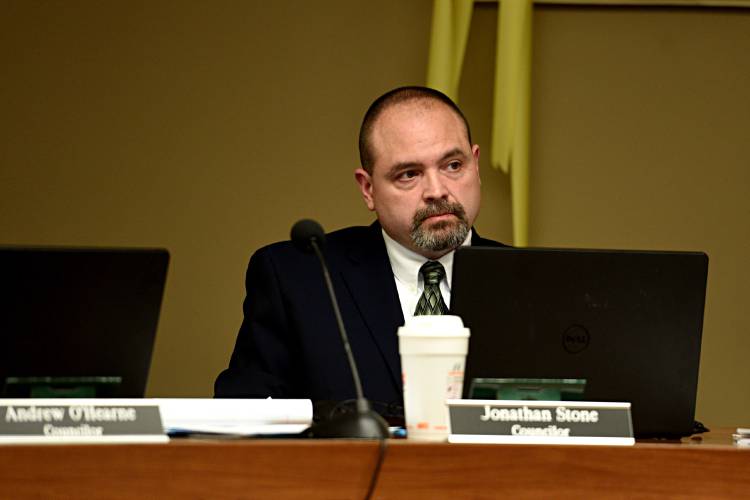Police Standards and Training Council addresses reports of inaction in officer misconduct

Then-Claremont City Councilor Jonathan Stone listens during the public comment portion of the City Council meeting on Jan. 9, 2019 in Claremont, N.H. Jennifer Hauck/Valley News file photo
|
Published: 04-25-2024 12:57 PM
Modified: 04-25-2024 1:11 PM |
The director of the Police Standards and Training Council said it couldn’t take action in the 2006 case involving Jonathan Stone, a full-time officer who reportedly made violent threats against colleagues, due to the lack of authority granted by administrative rules at the time.
In a press release issued on Wednesday, John Scippa, director of the council stated, “A case like this would be handled differently if it occurred today” responding to media reports scrutinizing the council’s perceived inaction despite being informed of the internal investigation into Stone, a now-former police officer for the city of Claremont.
In 2006, under the leadership of Police Chief Alexander Scott, the Claremont police department conducted two separate internal investigations into Stone’s misconduct. Following these investigations, Stone was terminated from his position in March 2006, and Chief Scott, following protocol, filed paperwork with the council.
The paperwork, known as Form B, served to inform the council of the termination, although it lacked specific details regarding the circumstances.
In response, the council requested further information from Chief Scott to determine whether the termination was related to a violation of the council’s administrative rules.
However, complications arose when the council received the second Form B in June 2007 stating that Stone’s status changed from termination to a “negotiated resignation.”
This alteration, according to a letter from the new council director, Donald Vittum, rendered the council powerless to intervene further.
Vittum’s letter also noted that the internal investigators retained relevant information of the case for the possibility of Stone applying for a position in New Hampshire law enforcement in the future.
Article continues after...
Yesterday's Most Read Articles
 A turbulent 50-year history: Inside the rise and fall of a tiny Catholic college in Warner
A turbulent 50-year history: Inside the rise and fall of a tiny Catholic college in Warner
 Update: Reactions for, against the more than 100 arrested at Dartmouth, UNH
Update: Reactions for, against the more than 100 arrested at Dartmouth, UNH
 Softball: Cassidy Emerson may have eight freshmen on her team, but the Falcons have glided to an 8-1 start
Softball: Cassidy Emerson may have eight freshmen on her team, but the Falcons have glided to an 8-1 start
 Franklin police arrest man after accidental shooting Wednesday
Franklin police arrest man after accidental shooting Wednesday
 Opinion: Sports have never been fair
Opinion: Sports have never been fair
 Hopkinton chocolatier transforms chocolates into works of art
Hopkinton chocolatier transforms chocolates into works of art
Seventeen years later, on Jan 1, 2023, new changes were implemented in the council’s administrative rules.
Now, all allegations of misconduct must be reported to the Conduct Review Committee (CRC) within 15 days, granting the council and the committee greater autonomy to address such cases independently.
They can act in a regulatory capacity independent of any separation agreement between a law enforcement agency and an employee, like the case of Stone, who is now a Republican State Representative.
“These changes have resulted from the collective effort of NH law enforcement executives working with the CRC and the council to provide a greater degree of procedural clarity and due process, and a greater degree of authority to address sustained findings of misconduct,” said Scippa.


 New Hampshire jury finds state liable for abuse at youth detention center and awards victim $38M
New Hampshire jury finds state liable for abuse at youth detention center and awards victim $38M Jurors hear closing arguments in landmark case alleging abuse at New Hampshire youth center
Jurors hear closing arguments in landmark case alleging abuse at New Hampshire youth center Voice of the Pride: Merrimack Valley sophomore Nick Gelinas never misses a game
Voice of the Pride: Merrimack Valley sophomore Nick Gelinas never misses a game
